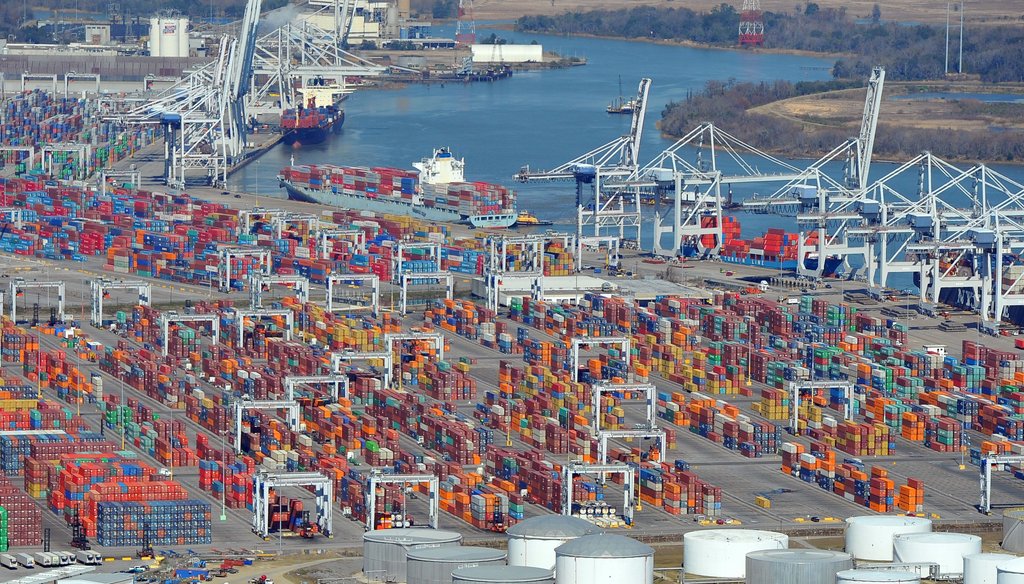

Our only agenda is to publish the truth so you can be an informed participant in democracy.
We need your help.


Georgia leaders want more federal funds to deepen the Savannah River to allow large cargo ships to enter its port and others along the Georgia coast.
The deepening of the Georgia ports is one of the few issues in this state that has the support of the state’s top elected officials regardless of party affiliation.
Shortly before President Barack Obama unveiled his proposed budget, U.S. Sen. Johnny Isakson, R-Ga., made his case for why more federal funding is necessary for the project.
"There is nothing bigger right now for the entire state," Isakson said in a meeting with the Albany Herald’s editorial board, referring to the project. "The port provides more than 297,000 jobs directly to the state of Georgia."
Isakson’s comments were picked up by several news sites across Georgia. We were curious if Isakson’s numbers were accurate and if there was any context missing.
In 2015, a project to expand the Panama Canal is scheduled to be completed, allowing larger cargo ships to sail to America’s Eastern Seaboard. Political and business leaders in Georgia believe the deepening of the Savannah River will allow some of those larger ships to dock at its ports, thereby creating more jobs and boosting the Peach State’s economy.
As an example of the significance of this issue, Georgia’s most prominent Republican and Democrat, Gov. Nathan Deal and Atlanta Mayor Kasim Reed, have worked together extensively to encourage Obama administration officials to provide more money for the ports.
A week after Isakson’s comments, the White House released the president’s proposed budget. To the dismay of many Georgians involved in the Savannah project, the budget set aside $1.28 million to deepen the Savannah River, a drop in the bucket for the $652 million project. Georgia taxpayers already have put up $231 million, and the state will need to come up with at least $30 million under the federal-state formula to deepen the river.
Isakson spokeswoman Lauren Culbertson forwarded us a report that referred to ports -- plural -- to back up his claim. The report was released in April 2010 and prepared by Jeff Humphreys, director of the University of Georgia’s Selig Center for Economic Growth. The report says there were 295,422 full- and part-time jobs in Georgia supported by the ports during the state of Georgia’s fiscal year 2009, which began July 1, 2008, and ended June 30, 2009.
We had two specific issues. The first was that Isakson did not mention other ports in his comments. While the overwhelming bulk of the jobs are attributable to the Savannah port, a number of the jobs came from the Port of Brunswick and other private ports scattered along the Georgia coastline, according to Humphreys’ report. Culbertson agreed that the report included other ports.
Humphreys said the senator may have generalized by referring solely to the Savannah port, since it is Georgia’s largest port.
"It’s quite understandable," Humphreys said.
The Savannah port generates an estimated $447 million in annual federal, state and local taxes, according to Humphreys’ most recent research. The Brunswick port, which is about an hour drive from Savannah, brings in about $23 million a year in tax revenue.
Our other issue concerned whether all of these jobs could be directly attributed to the ports, as Isakson seems to have implied in his remarks to the newspaper’s editorial board.
There is a more recent report on the ports, released in April 2012, as opposed to the report Isakson cited from 2010. In the newest report, Humphreys estimated there were about 352,000 full-time and part-time jobs resulting from the ports. Humphreys said 154,000 jobs could be attributed to companies that use the ports, and the remaining 198,000 jobs were indirectly a result from the ports.
Humphreys said it’s valid for Isakson to include all of these jobs.
Those indirect jobs, Humphreys said, range from companies that work with businesses at the port, to the diners that feed port workers. Humphreys also used the word "port-dependent jobs" to describe "indirect jobs."
"It’s semantics," Humphreys said of the difference between "port-dependent jobs" and "indirect jobs."
These jobs are across the state, the economist said. Although Chatham County is home to the Savannah port, Humphreys’ study concludes Fulton County is the recipient of more jobs from the ports.
Humphreys didn’t quibble much with the senator’s argument.
"Unfortunately, his numbers are a little out of date," Humphreys said. "In my opinion, he’s basically telling the truth."
To sum up, Isakson said the Savannah port provides about 297,000 direct jobs to Georgia’s economy. The senator would have been more accurate if he said "port industry" or simply said "ports." Isakson underestimated the jobs impact in his argument. His estimate was based on a 2010 report, although the most recent report estimated the total at 352,000 jobs.
Isakson’s remarks were not precise, but they are largely on target. We rate this claim Mostly True.
Albany Herald, "Isakson: Port in Savannah No. 1 issue," April 5, 2013.
Emails from Isakson spokeswoman Lauren Culbertson, April 15 and 25, 2013.
Georgia Ports 2010 Year in Review, July 13, 2011.
Georgia Ports Study, April 2012.
Press release by U.S. Sen. Saxby Chambliss, April 29, 2013.
Telephone interview with Jeff Humphreys, director of the University of Georgia’s Selig Center for Economic Growth, April 30, 2013.
In a world of wild talk and fake news, help us stand up for the facts.
